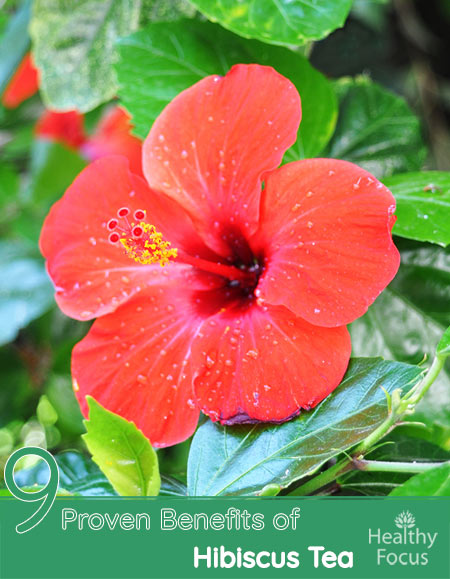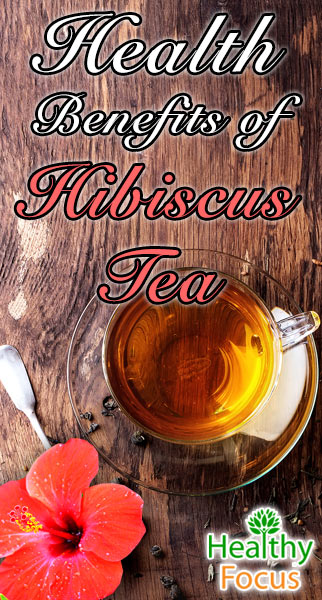Last Updated on December 10, 2019 by Marc Seward
What is Hibiscus Tea?
Hibiscus tea is my favorite tea; it has a sour taste reminiscent of cranberries so many people refer to it simply as ‘sour tea’. This delicious tea is wonderful when drunk either hot or cold and I was drinking it for a long time before I ever found out about its health benefits.
It is extremely thirst quenching and I make sure to always have a cold bottle made up in the evening to drink down after my nightly jog. Because of its sour, tart flavor a lot of people sweeten it to taste but I much prefer it in its natural unsweetened state.
Hibiscus tea is made from the dried flowers of the hibiscus sabdariffa plant also known as Roselle which grows in many sub-tropical regions but is now cultivated in many warm countries including Mexico, Thailand and Jamaica.
Like so many other herbal teas, hibiscus has multiple health benefits because of its medicinal properties including anti-inflammatory and antioxidant compounds. Much of the research has focused on its ability to reduce blood pressure and cholesterol levels but it has many more benefits besides.
Health Benefits of Hibiscus Tea
1) It Lowers Blood Pressure
Scientists have taken a real interest in hibiscus tea over the past few years especially with regard to its effects on high blood pressure and the studies to date have been very promising. It works because it helps widen the arteries and blood vessels and is known medically as a vasodilator.
One study published by the University of Boston in 2009 recruited 65 participants with mild hypertension. They were divided into 2 random groups and given wither 3 cups of hibiscus tea each day or a placebo for 6 weeks.
The researchers found that drinking hibiscus tea was very effective. Subjects who drank the tea experienced significantly lower blood pressure levels than the placebo group. Moreover the participants who benefited most were those with the highest blood pressure levels at the beginning of the study. (1)
The results of the Boston study backed up findings from an earlier Mexican trial involving 75 participants with moderately high blood pressure. The subjects were again divided into 2 groups and treated with either half a liter of hibiscus tea or an anti-hypertension medication called Captopril.
At the end of the 4-week trial, both groups experienced an average 11% reduction in blood pressure levels with no significant differences between the two groups which suggests hibiscus tea is just as effective as a commonly prescribed blood pressure medication with the added advantage of being natural and far safer. (2)
Numerous other studies have confirmed just how effective hibiscus tea can be in treating high blood pressure with only a few delicious cups a day.
2) It Reduces Cholesterol
As well as its ability to reduce blood pressure, studies have also revealed that this wonderful tea can also protect your heart and your health by reducing cholesterol levels.
One study published in 2009 recruited 60 adults with diabetes and randomly placed them into two groups who were given either two cups of hibiscus or black tea each day for a month.
Following the 4 week period, the researchers were able to demonstrate that hibiscus tea significantly reduced both HDL and LDL cholesterol levels while black tea only effected HDL cholesterol. Researchers concluded that hibiscus tea was able to significantly improve blood lipid profile in diabetic patients. (3)
3) It Helps with Weight Management
Hibiscus tea is absolutely jammed with natural antioxidants which improve our body’s overall health and also contributes to weight control by improving metabolism. Antioxidants are known to help fight illness and improve our immune systems and stronger, healthier bodies can lose weight more efficiently.
Hibiscus tea also helps you control, your weight in other ways too. It has natural diuretic abilities which helps you to excrete excess fluid that tends to be retained when you diet. A few cups of hibiscus tea each day will help you to get rid of this excess fluid by increasing your volume of urination and also help prevent bloating.
Hibiscus tea may also prevent carbs from being absorbed into the body. It contains a compound called phaseolamin which acts as an enzyme inhibitor. Phaseolamin specifically helps block the production of amylase – an enzyme which breaks down starches and sugars. This process is believed to aid weight loss and improve lean mass.
Hibiscus tea is certainly no magic pill but when drunk as part of an overall diet plan, it may very well help you to manage your weight while offering multiple other benefits. It is also a delicious post exercise thirst quencher when drunk very cold.
4) For Menstrual Cramps
The benefits of hibiscus tea extend to women who are suffering from some of the symptoms associated with menstruation like cramping and bloating. A cup of hibiscus tea can help ease these pains as well as having a calming effect on the mind which may help alleviate emotional issues like mood and depression.
5) It can Alleviate Depression
The flavonoids contained in hibiscus might help you with a number of emotional problems. According to anecdotal evidence and some of the research, a soothing cup of hibiscus tea can help reduce anxiety, improve mood and even help fight depression. An Indian study published in 2012 discovered that certain flavonoids contained in hibiscus tea had antidepressant potential. (4)
6) It Protects the Liver
Hibiscus tea can also help keep your liver strong, healthy and free of disease. A study published in the year 2000 found that the antioxidant anthocyannins present in hibiscus significantly reduced oxidative damage and inflammatory lesions in the livers of rats. (5)
7) It Improves Digestion
Most herbal teas can have a very beneficial effect on your digestive system and hibiscus tea is no exception. It can help relieve constipation, bloating and gas. The polyphenols in hibiscus tea help stimulate the entire digestive system which keeps our entire bodies working more efficiently and helps prevent symptoms associated with poor digestion like stomach upset and heartburn.
8) It Boosts the Immune System
Hibiscus tea is rich in natural antioxidants and vitamin C and is considered an excellent tonic for the immune system. A healthy immune system is vital to our overall health and well-being and can help protect us against common sicknesses like the cold and flu as well as reducing the risk of more serious illness.
9) Helps Build Healthy Skin
Not only does hibiscus tea have all these wonderful internal health benefits but it can also help you to look more beautiful. We have already mentioned the anti-inflammatory and potent antioxidant properties of this herbal wonder.
These same antioxidant properties may help combat many skin complaints like eczema and acne. The antioxidant nature of the drink also helps keep the skin fresh and healthy and may even help reduce signs of aging like wrinkles and other age related blemishes.
Hibiscus Tea Side Effects
Hibiscus tea is generally considered safe to drink but certain potential side effects should be noted.
Because of its known ability to significantly reduce blood pressure, people with low blood pressure or those taking blood pressure medications should avoid drinking it.
Research has shown that hibiscus tea has estrogenic properties. Drinking this tea in excess may interfere with fertility so expectant mothers and those trying to conceive are advised to avoid it.
There are some reports that hibiscus tea has a mild hallucinatory effect on some people.
(1) http://www.ncbi.nlm.nih.gov/pubmed/20018807
(2) http://www.ncbi.nlm.nih.gov/pubmed/15330492
(3) http://www.ncbi.nlm.nih.gov/pubmed/19678781
(4) http://www.ncbi.nlm.nih.gov/pmc/articles/PMC3469946/
(5) http://www.ncbi.nlm.nih.gov/pubmed/10762726


Leave a Reply
You must be logged in to post a comment.